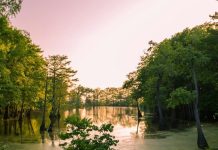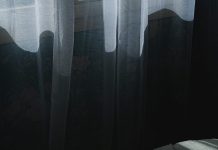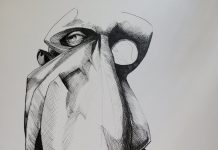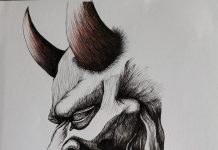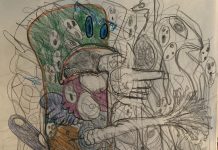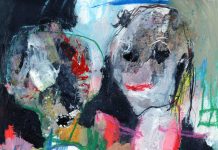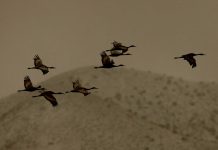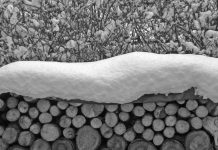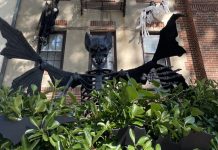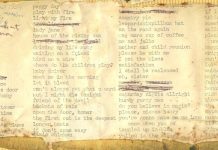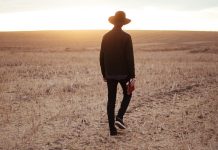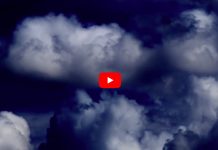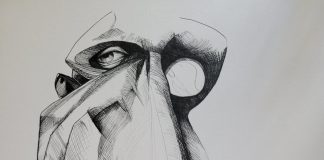He pointed it out like a carnival oddity
a bearded lady or monkey playing guitar,
perhaps an albino deer or lion with the
head of an eagle. Or is it the other way
around? He used the tone saved for eyeing
celebrities where I came from—a neophyte
politician embracing some cause no farmer
had time to consider. Instead his crooked
finger aimed at a squat building with clapboard
sides as white as a Lutheran church in Peoria.
“That is the Shooks Town Hall,” he said
as if his firmness made it a landmark.
“Wonder how many they get for meetings?”
Proud to show irony was not lost on him,
a wry smile creased his face. “There must
be 200 people in town. It should be big
enough to hold them all.” And he left me
to hold the bag—wondering if this was
all about humor or a profound conviction
regarding fairness. Before I could settle
on the matter, he pointed out the 15-by-25
bait shop, the last one between the crossroads
and lake where we were bound to chase
mid-season walleye and live on hot dogs
and bologna for three days. But I could not
put behind me the joke or the tiny town
slipped too soon into a tunnel of fields
divided by stands of yellow birch and jack
pine, furrows too much like the land turned
over for my father’s grave. Neither could
I tell him how much I needed him to confirm
he was not about to slip into the same abyss—
this blur of life passing our windows at seventy
miles an hour: tractor then stream then tree stand
then bog all ending with the finality of a period
at a tidy Amish farm. We had come a long way,
four hours’ worth of stories about old friends
and odd jobs, the war her never wanted to join
and then watched in the distance like an acolyte
not ready to read the signs in the smoke. This
had not always been our story, two characters
in dialogue punctuated by the ruffle of a shared
bag of peanuts, the slosh of black coffee in foam
cups. He was skeptical of me, and I of him, like
boxers pacing the ring, using arms to measure
the distance neither wished to close. He referred
to me as white collar as if that were a crime, and
I covered the offense with layers of bitterness
like varnish slopped on a petulant teen’s woodshop
disaster. Forty acres gave us room to dance around
nearly everything, but a 19-foot v hull forced our
issues to the surface. Bouncing through pencil reeds,
we hummed to the hymns of loons and saw how a
shimmer breaks the light too bright to consume into
a million digestible parts. As engines cleared their
throats, we baited lines with questions cast into
the depths of our past, slowly retrieved through
weeds in the present and, finally, the bitter pill
of the waning future. We covered the weight
of words and the buoyancy of human kindness.
He slipped fish into the live well, fooling me
into thinking we were off the bite, then laughed
like a boyhood version of himself, stealing off
to swim in the forbidden waters of the reservoir
with his brothers. It is funny how tomfoolery
yields pure gold, nuggets we mine to invest
in one another at the perfect time. I caught
myself thinking about the Shooks Town Hall
this week and looked it up between the press
of tasks pointless compared to walleye fishing.
This winter a truck spun awry on the ice,
barreled through the building and sent a
blizzard’s worth of clapboard splinters across
a frozen field of twenty-first century disinterest.
To answer his question, I doubt they got a full
house for a meeting in years, not for a vote
or a lutefisk dinner with bacon and pea stew.
But the bait shop survived, at least for now,
though the lake will likely outlast it—as will
the bog, the stream, the farm and most likely
the tractor. Though the characters in this fishing
story will change. They will repair different
sorts of brokenness—some more easily and some
with even more bait lost on the most-distant casts.
And we will be the mist on the water . . . laughing.

